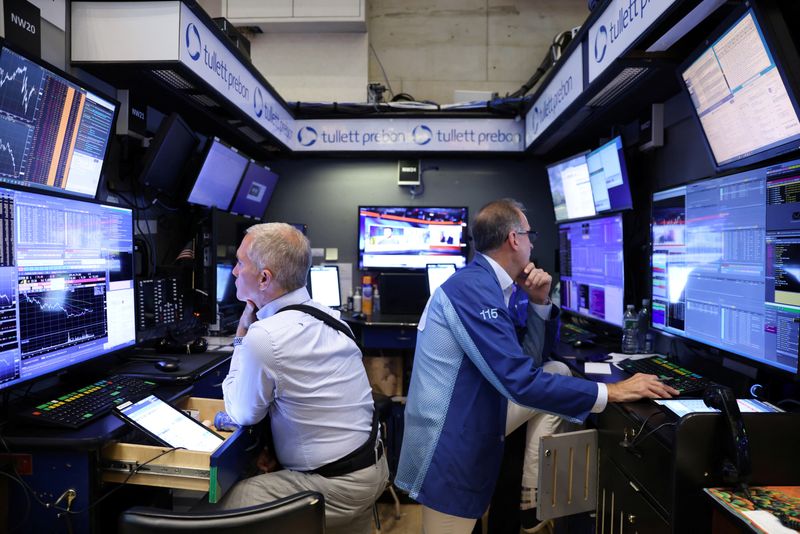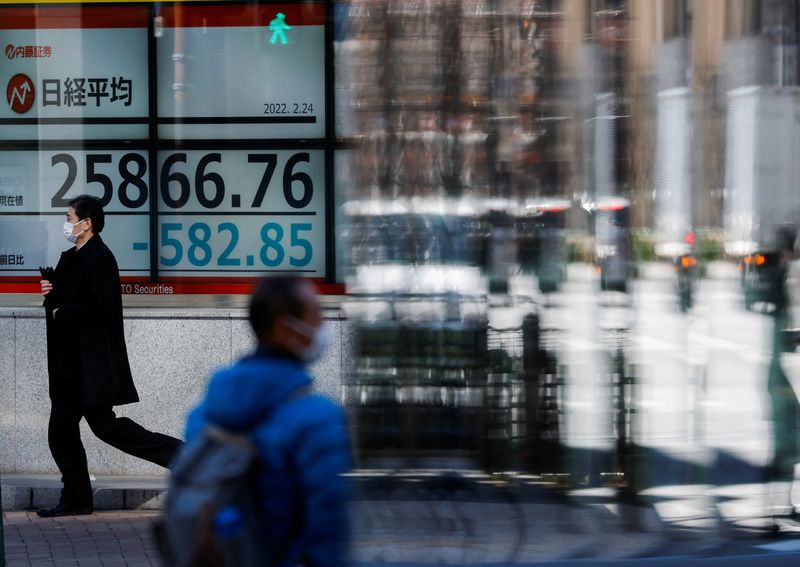By Herbert Lash
NEW YORK (Reuters) -The benchmark 10-year Treasury yield hit its highest in over a decade on Monday and the dollar strengthened as investors were on edge before an expected hefty Fed interest rate hike this week to tackle inflation.
The 10-year's yield shot to 3.518%, its highest since April 2011, before backing off. The higher yield helped strengthen the dollar and made gold less attractive as concerns about the economy in light of higher rates cooled risk taking.
But stocks on Wall Street rallied as hedge funds positioned themselves on the off-chance the Fed's tone is less onerous than markets expect when policymakers raise rates on Wednesday, said Michael James, managing director of equity trading at Wedbush Securities in Los Angeles.
"There's positioning going on just in case there's something that comes out of the Fed that proves to be less hawkish. I don't think anyone is predicting that's going to happen," he said. "The majority of people are in the negative camp right now."
Stock trading on Wall Street and in Europe was choppy for most of the session as central banks around the world were expected to increase borrowing costs this week and slow economic growth.
FedEx Corp (NYSE:FDX)'s warning last week of a global demand slowdown has weighed on U.S. equities as investors reassess stock valuations, said King Lip, chief investment strategist at Baker Avenue Asset Management in San Francisco.
"Our biggest concern now, and the reason why you're seeing such choppiness in the market today, is that there's more uncertainty about earnings now, in addition to the concern over rate hikes," Lip said.
"We may be going in for a hard landing rather than a soft landing and the hard landing being the Fed perhaps over-tightening in a situation where we're already seeing the economy decelerate," he said.
Wall Street rallied in thin, late trading. The Dow Jones Industrial Average rose 0.64%, the S&P 500 gained 0.69% and the Nasdaq Composite added 0.76%.
Earlier in Europe, the broad STOXX 600 index closed down 0.09% and MSCI's U.S.-centric all-country world index gained 0.38%. Overnight in Asia stocks lost ground.
Investors heard a hawkish message from Fed Chairman Jerome Powell at the Jackson Hole banking symposium in August, but then remained in denial until it became clear inflation was stubbornly high, said George Goncalves, head of U.S. macro strategy at MUFG Securities Americas Inc in New York.
After the past three Fed meetings, there have been relief rallies in bonds and equities as markets interpreted Powell as being dovish. But a rally this time is unlikely when policymakers conclude a two-day meeting on Wednesday, he said.
"People are wising up to the fact that the Fed means business," he said. "The only way to contain this inflation is to get ahead of it, and they're still behind the curve. Peak hawkishness is getting closer, but we're not there yet."
Markets are pricing in a 75 basis points hike, with futures showing an 18% chance of a full percentage point increase on Wednesday, according to CME's FedWatch Tool.
Markets also indicate a real chance that rates could hit 4.5% by March as the Fed is forced to tip the economy into a recession to subdue inflation.
The two-year yield, a barometer of future inflation expectations, climbed to a fresh almost 15-year high of 3.970%. European government bond yields also rose. [GVD/EUR]
TIGHTENING TIME
Most of the central banks meeting this week - from Switzerland to South Africa - are expected to hike, with markets split on whether the Bank of England will move by 50 or 75 basis points.
But China's central bank cut a repo rate by 10 basis points to support its ailing economy. Chinese blue chips still finished 0.1% lower.
The other exception is the Bank of Japan, also due to meet this week, and which has shown no sign of abandoning its ultra-easy yield curve policy despite a drastic slide in the yen.
Trading was thin in Britain as markets were closed in observance of the state funeral of Queen Elizabeth.
The dollar rose 0.21% against the yen, backing off from the 24-year peak of 144.99 two weeks ago amid increasingly strident intervention warnings from Japanese policymakers.
The dollar index rose 0.055%, with the euro up 0.06% to $1.0021.
Oil prices edged up in volatile trading as worries of tight supplies outweighed fears that global demand could slow due to a strong dollar and possibly large rate increases.
Brent settled up 65 cents at $92.00 a barrel, while U.S. crude rose 62 cents to settle at $85.73.

U.S. gold futures settled 0.3% lower at $1,678.20 an ounce.
Bitcoin, which also moves in line with investors' risk appetite, hit a three-month low of $18,271 but later rebounded, up 0.22% to $19,461.00.
